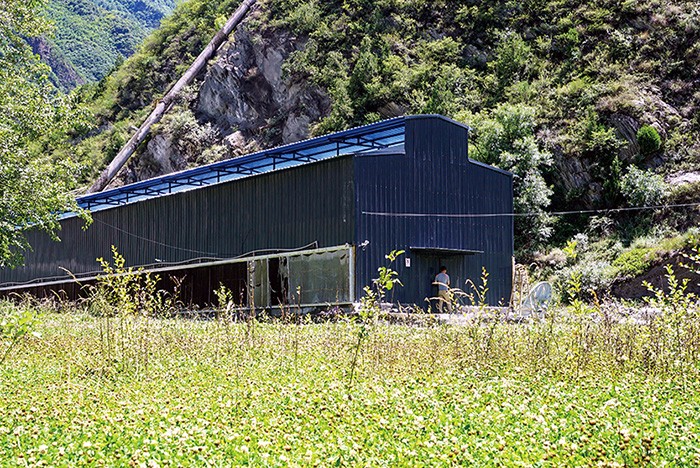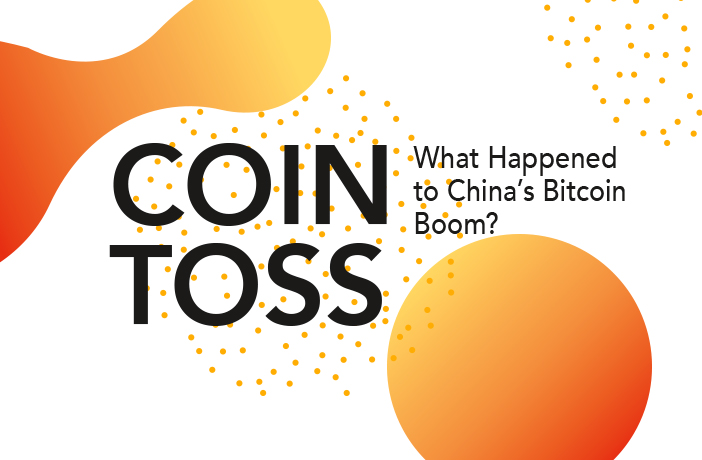Photos and graphics by Holly Li.
When Eric Mu says that the village of Moyu, in western Sichuan, is remote, he means it. Culturally more Tibetan than Han, the tiny settlement sits in a valley among soaring mountains and deep gorges. The village is only connected to neighboring communities by a rickety suspension bridge, which wobbles above river rapids below. Mu crossed it once. He’ll never cross it again. It was terrifying, he says.
Life in Moyu is slow. When Mu is there, he runs – passing along winding roads and through tunnels that pierce the mountains, some as long as 3 kilometers. His coworkers entertain themselves with mahjong and smartphones. Some of the villagers grow corn.
Industry in Moyu has also been slow. A hydropower plant was built years ago nearby the waterfalls that crash down from the steppe. The plant’s engineers had hoped to sell their hydropower to the national grid, but demand wasn’t as high as they’d projected. The plant made barely enough money to pay staff wages.
So when Mu’s employer, HaoBTC, pitched the idea of building a bitcoin ‘mine’ that would run on the town’s ultra-cheap hydroelectric power, local reception was positive. It didn’t matter that the managers at the plant had no clue what bitcoin was. It was bringing money, and it was bringing jobs. Local government officials were pleased.
A few months later, rural Moyu became home to previously unimaginable tech power. And it is just one of a growing number of Chinese villages hosting massive bitcoin mines – sprawling complexes of computer servers dedicated to obtaining bitcoin, the world’s first tradeable ‘cryptocurrency.’

Eric Mu stands inside HaoBTC's mine in Moyu.
Because while the industry surrounding bitcoin – or the “currency of the Internet,” as Mu puts it – is global, China is taking the lead.
In Moyu – and in digital mines throughout the world – thousands upon thousands of mining computers run simultaneously inside a colossal warehouse. Bitcoin is a fully decentralized currency, which means that no one institution or government controls it. Instead, the underlying technology of bitcoin, known as the blockchain, is powered by volunteers around the world who offer up their computers to keep the chain
functional and secure. These volunteers are the miners.
“I don’t know where the phrase ‘mining’ comes from, but it’s probably because bitcoin is designed to mimic gold,” says Mu. “It has some of the same features as gold – it has a finite market supply, for example.”
The blockchain system provides an incentive for miners to mine: Each day, it releases a certain number of bitcoins and distributes them proportionately among users based on the amount of computing power they have contributed. In short: The more power you have, the more bitcoins you’ll receive. For miners, it’s a simple equation: The faster the computers and cheaper the electricity, the higher the profit margin.

The exterior of the mine
“People keep buying more and more machines, and they’re getting larger and larger,” says Mu.
“Sometimes [people] call it an arms race.”
HaoBTC is no exception. Chinese companies mine more bitcoin than any others, and HaoBTC accounts for 5 percent of global mining, according to the online bitcoin resource blockchain.info.
“The noise is nerve-wracking,” says Mu of life inside the mine. “It feels like a million bees buzzing around your ears non-stop. Although it’s hot, curiously you don't sweat at all, because all those powerful ventilation fans create strong airflow. I assume it feels a bit like a hot and windy desert, not that I’ve ever been in such a place.”
The best mining computers run on 1,300 watts – roughly the same energy consumption as an electric heater. “But that’s just one,” says Nishant Sharma of Bitmain, the Beijing-based company that produces the world’s leading mining computers. “[Mines] have thousands of them. Imagine the kind of cooling you would need to make sure they don’t burn.”

Then imagine how much electricity you’d need to power all the computers and the fans. This is where China excels – it’s a tech-savvy country with access to cheap power. (“Mining is big in China because the costs are very competitive compared with the rest of the world,” explains Mu.)
Sharma’s employer, Bitmain, also runs mines across the world – in Canada, Iceland and China. Sharma says his company originally invested in places where coal was cheap – primarily Shanxi and Inner Mongolia – but later shifted to hydropower in the Western mountains like HaoBTC did.
But in Beijing, where the company is based, Bitmain operates a website that sells the most advanced bitcoin mining computers on the planet. “Nothing in the world has that kind of computational power,” says Sharma.
Sharma first got into bitcoin in Shenzhen (he had previously been living in Guangzhou, where he worked for an LED manufacturer), but his interest in the industry led him to China’s capital. Or as he calls it: “The Silicon Valley of the world when it comes to bitcoin.”
But mining isn’t the only way Beijing’s businesspeople are profiting from cryptocurrency. The world’s largest bitcoin exchange, OKCoin, is also based here.
There are hundreds of exchanges that allow partipants to buy and sell BTC in different currencies worldwide, but OKCoin currently carries out more daily trade than any of them. At the time of publication, OKCoin had facilitated more than RMB49 billion’s worth of bitcoin trade in the 30 days prior, according to industry statistics site bitcoincharts.com.
Chinese bitcoin traders outnumber their counterparts in other countries by a staggering margin. Currently, 93 percent of all bitcoin trades are with renminbi. And OKCoin accounts for 76 percent of these transactions.
While Bitcoin’s value fluctuates more than most currencies, it has become more valuable in recent years – rarely dipping below USD300 per coin since 2013. Many Chinese bitcoiners both invest in the currency and trade it.
One person who profited from the trade is Neil Woodfine, who was working in China after graduation when a friend sent him an article about bitcoin. With a bit of money saved in the bank, he decided to invest – just two days before the now-famous 2013 price jump.“[My investment] went from 190 US dollars all the way up to 1,200,” he says. “By the end of that month the price started to crash down again, but I was already completely obsessed, so it didn’t matter.” Later that year, Woodfine got a job at OKCoin.

Co-founder of bitcoin startup Remitsy, Neil Woodfine, at work in Beijing's Tech Temple
Today, Woodfine runs Remitsy, a Beijing-based startup that makes it easier and quicker to send money abroad by using bitcoin.
“We use bitcoin as the middle step when converting currencies into renminbi,” he explains. “So if you’re a business and you want to buy, say, plastic cups from China, we receive your US dollars, convert them immediately into bitcoin, and then sell the bitcoin in China. Then we’ve got renminbi. We deliver the renminbi quickly and cut out that huge network.”
The network Woodfine refers to is SWIFT, the bank-sanctioned system traditionally used to send money abroad. SWIFT’s international payments can take days or even weeks. With bitcoin, they take minutes.
Woodfine attributes Beijing’s dominance of China’s bitcoin industry to “the fact that the internet industry is so strong here.”
“If you look at any of the startups, most of them are in Beijing,” he says. “In any internet startup hot spot, you’ll find people using bitcoin.”
Remitsy’s offices are testament to this. Woodfine rents desks for his small team in Tech Temple, a co-working space in downtown Beijing that offers cheap office space to hundreds of tech-minded entrepreneurs. On workdays, the space hums with activity – and by ‘activity’ I mean young people in T-shirts and jeans typing furiously at their computers. On my first visit, the music at the in-house cafe is so cinematic that it seems like it is intentionally soundtracking entrepreneurs’ ambitions.

Woodfine’s own ambitions have a certain flair. He’s a skilled orator when describing his company, regularly pounding his fist on the table for emphasis. It’s clear that bitcoin entrepreneurship isn’t just something he’s been talking about for a long time – it’s something he’s passionate about.
Outside of Woodfine’s (very long) work hours, he runs an English-language bitcoin meet-up alongside Mu, which gives him the chance to talk to bitcoin enthusiasts who work outside the industry. In Beijing, he says, bitcoin is becoming more mainstream.
“Slowly but surely, more and more people are buying bitcoin,” says Woodfine. “People like you have got some bitcoin now.”
He’s right. In the course of reporting this story, local entrepreneur Brendan Gibson, a friend of Woodfine’s, convinces me to download a virtual wallet (read: iPhone app). To see how the process works, I download Blocktrail from the App Store. Within five minutes, Gibson has sent me BTC0.0060 (RMB23.50). Each bitcoin is infinitely divisible, and at the time of publication, one bitcoin was equal to RMB3,858.33.
Unlike Woodfine, Mu or Sharma, Gibson does not work for a bitcoin exchange or mining company – he’s just an enthusiast who believes in the currency’s promise of institution-free banking and anonymity. And in his own, non-corporate way, he’s raising awareness of its benefits.
“I’ve probably helped over 100 of my friends set up bitcoin wallets,” he says. (I believe him – just moments later he’s offering That’s Beijing’s photographer, Holly, help to get started.)

Brendan Gibson checks his bitcoin wallet on his phone in his hutong neighborhood
Gibson’s distrust of banks stems from the 2008 financial crisis, when he was working in home loans at Bank of America.
“I was part of that mortgage crisis, front and center,” he says, over lunch in Beijing’s hutongs.
Gibson’s online businesses accept bitcoin, and on a recent trip to Spain, he used a special debit card that allows him to spend bitcoin wherever Visa cards are accepted. But regular bitcoin spenders are still rare in China, where many places don’t even accept credit cards – let alone virtual currency. It’s still wildly impractical to buy your coffee with it.
For China-based bitcoin enthusiasts, it’s much easier to invest. An investor I speak to in Anhui, Xu Jian, says: “I invested most of my assets in bitcoins. I am not using it daily – there's not much use.”
As Chief Strategy Officer of OKCoin, Jack Liu is invested in investing. But to Liu, there’s much more to the currency than that.
Over the past three years, Liu has helped grow OKCoin into China’s largest bitcoin exchange. Today, however, he’s looking to the future. At OKCoin’s Beijing offices, just north of the famed universities of Haidian and the startup hub of Zhongguancun, some of the most forward-thinking innovation in the global bitcoin industry occurs.
“It’s a bit limiting to think of it as just a currency,” Liu says. OKCoin recently launched OKLink, a
service that uses the blockchain – the infrastructure behind bitcoin – to connect companies and financial institutions from around the world. The blockchain keeps a digital record of all bitcoin transactions that have ever occurred, making the coins near-impossible to forge, or “double spend.”
“We view the blockchain as a trust machine,” says Liu, explaining that blockchain technology would enable the OKLink team to connect financial companies “behind the scenes” – resulting in a platform that would serve as a faster, easier alternative to SWIFT.
Bitcoin technology is rumored to be the next big development in the financial tech industry. A report published last month by the World Economic Forum states that “this technology has the potential to ‘live up to the hype’ and reshape financial services.”
Beijing has a historic opportunity to lead that revolution. I ask Liu about the city’s potential.
“I’m excited to see more innovation come out of Beijing. I think it’s on the way,” says Liu. “Within the bitcoin community, the focus has so far been on Chinese mining and Chinese exchanges. But as that ecosystem built up over the past two or three years, it’s grown more entrepreneurial.”
Liu is visionary, but also intensely meticulous – pausing and re-explaining concepts, intent on me fully understanding blockchain’s potential to revolutionize finance as we know it. I’m amazed to learn he’s only 28 – even though under-30s are common in this ultra-young industry.
“There is a lot of money, a lot of computer scientists and a lot of young passionate entrepreneurs,” says Jelena Strelnikova, a compliance officer at exchange company Allcoin. “It feels that almost everything is possible here in China.”
Ultimately, it’s this optimism toward the future that keeps Beijing’s bitcoiners going.
Mu has now made three trips to Moyu, the longest of which lasted three months. When he’s home in Beijing, he works at HaoBTC’s Haidian offices, hangs out with his laptop at The Bookworm and runs meet-ups alongside Woodfine.
The mining doesn’t stay in Sichuan. Mu runs a tiny mining operation, with just one computer, in his home. It’s not remotely on the scale of HaoBTC – it’s merely an experiment, something he does for fun.
HaoBTC will have to replace its computers every year if it wants to keep up with the pace of development. For Mu, that means more trips to Moyu, and a couple weeks after our chat, that’s exactly where he is.

“I think a two-week retreat away from crowded and polluted Beijing is still nice, despite the noise and isolation,” he writes in an email from the village. In Moyu, he’s a far cry from the tech hub – and the bitcoin hub of the world – that is Beijing. But that’s OK. For Mu, this isn’t just a job; it’s a passion.
“In my old job working as a media researcher, I didn’t see any future. I saw a dead-end. But this space is so new and so unpredictable,” he says.
“The future is infinite.”
Photos of Moyu mine provided by Eric Mu.
An earlier version of this article implied that Bitmain sells mining computers from its Beijing headquarters. Bitmain sells via its website.






















0 User Comments